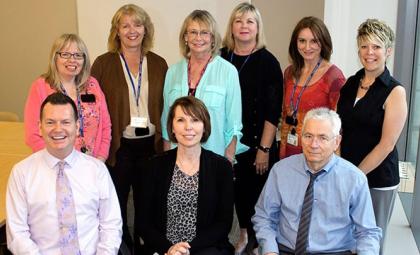Playing quarterback for clients with complex mental health needs

NIAGARA HEALTH’S ICC PROGRAM EMPOWERS CLIENTS TO IMPROVE THEIR MENTAL WELLNESS
Wednesday, September 05, 2018 – Michelle Holden
When staff at Niagara Health realized that clients with complex mental health needs were frequently coming into the emergency department (ED), they felt there had to be a better way to reach these clients.
In April of this year, Barb Pizzingrilli, the Director of Patient Care Mental Health & Addictions, and her team launched the Wellness Recovery Integrated Comprehensive Care (ICC) program. “We took an existing mobile team in outpatient and rebranded it, shifting the care provided.” Pizzingrilli says the program has two streams: (1) individuals with complex needs; and, (2) individuals with emerging needs who would benefit from early intervention.
One of the unique elements of Niagara’s ICC program is its focus on education and skill development. “We want to work with clients to assist in building knowledge and the skills required to better manage their illness, including medications, how to manage a crisis, and wellness strategies,” said Pizzingrilli.
“The other unique piece,” said Pizzingrilli, “is that we proactively identify clients based on system triggers.” For example, if somebody visits the ED three times over three months and has an admission, the ICC team is alerted so they can intervene. “One of the innovative aspects of the team is the brief psychotherapy intervention that is being used to assist individuals with understanding the reasons why they are coming for service so that care interventions can be tailored to specific needs,” said Pizzingrilli. “It’s about understanding the journey of the client as they go through the system.”
HOW IT WORKS
Clients are connected with a team of healthcare professionals from Niagara Health who work with them to identify their mental health needs and to ensure they are receiving the best possible care. The team includes Registered Nurses, Social Workers, Occupational Therapists, Nurse Practitioners, a Psychologist and a Psychiatrist.
People referred to the program include individuals with a mental health diagnosis, such as severe depression, bipolar or schizophrenia, and people who are at high risk of readmission to a mental health inpatient unit or who frequently visit the ED.
Pizzingrilli says the ICC team gets reports on a weekly basis of clients who would benefit from its services and this ensures they stay on top of all new and existing clients with care needs.
One success story Pizzingrilli shared was around the assessment of a client who had been coming to the ED daily who required assistance navigating the system. Part of the work with this client was conducting a comprehensive assessment, including a review of the working diagnosis. Based on the assessment outcomes, the team was able to work with the individual to develop a personalized care plan that enabled the client to access supports in the community rather than come to the ED.
A CONNECTION TO THE COMMUNITY
“ICC staff at Niagara Health act as a kind of quarterback for the client,” said Pizzingrilli. “They are there to help the clients navigate the system and connect them to the right community services.”
For many clients, living by the 9-5 schedule of certain healthcare services can be a challenge and it means more people end up in the ED when they are unsure where to go. To help in this area, every client connected with the ICC has a clinician who helps them develop a safety plan. If something happens after hours, the client knows to call the Crisis Outreach and Support Team (COAST), which has a copy of each client’s safety plan so they can talk and coach them through the steps.
LOOKING AT THE RISKS
The team at Niagara put safety at the forefront when planning this new ICC program – safety for the client and for their staff.
Pizzingrilli said they had to be careful how the program was communicated, encouraging clients to use the resources available to them in the community, while at the same time not discouraging them from using the ED for emergencies.
The ICC team also recognized that community partners may need support so they’ve left referrals to the program open. “We don’t want people feeling isolated when managing complex patients,” said Pizzingrilli.
The ICC team uses services offered by the Ontario Telemedicine Network (OTN) to connect with each client and build a relationship before going into the home. This also helps to ensure staff safety. Additionally, the Clinical Lead for the ICC Program has completed a detailed Personal Safety Manual for staff who go out into the community to do home visits. The manual is intended to equip staff with information about how to maintain their safety at all times.
Details around safety are raised when Pizzingrilli and her team take part in the annual Risk Assessment Checklists (RAC) review led by the organization’s Risk Management department. “Each year we’ve added more around our processes to manage and reduce risk, for both inpatient and outpatient services.”
When it comes down to it, Pizzingrilli shared that the focus for ICC is on not making assumptions about any particular client – the reason someone visits the ED today may not be the same reason they come in tomorrow. “We have to look at each situation with fresh eyes.”
Read more about Niagara Health’s ICC program.
By Michelle Holden, Communications & Marketing Specialist, HIROC
Risk Assessment Checklists (RAC) is a tool which enables healthcare organizations to systematically self-assess compliance with mitigation strategies for HIROC’s top risks. Questions about the RAC program and how it can be applied to your organization can be directed to [email protected].
